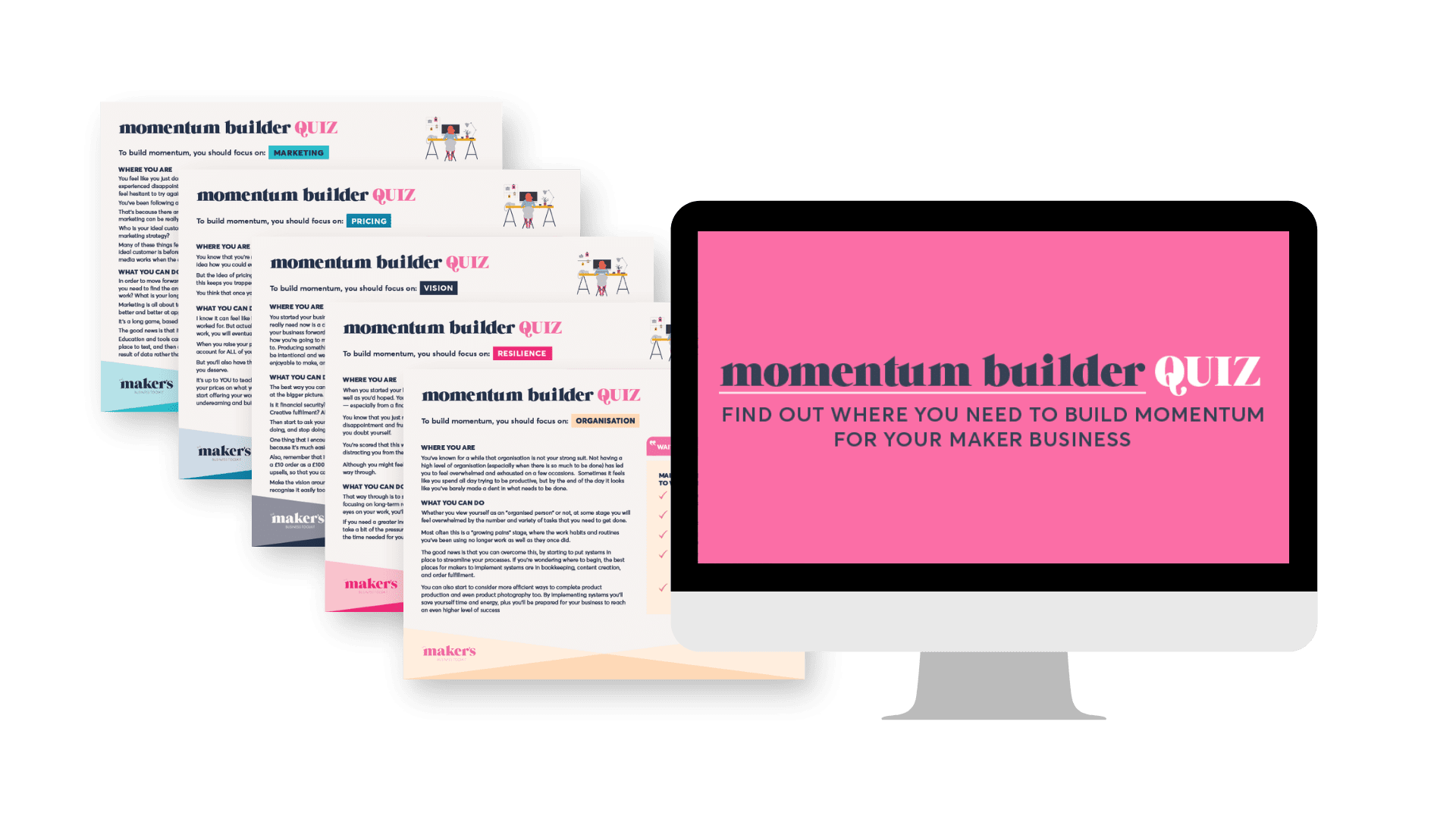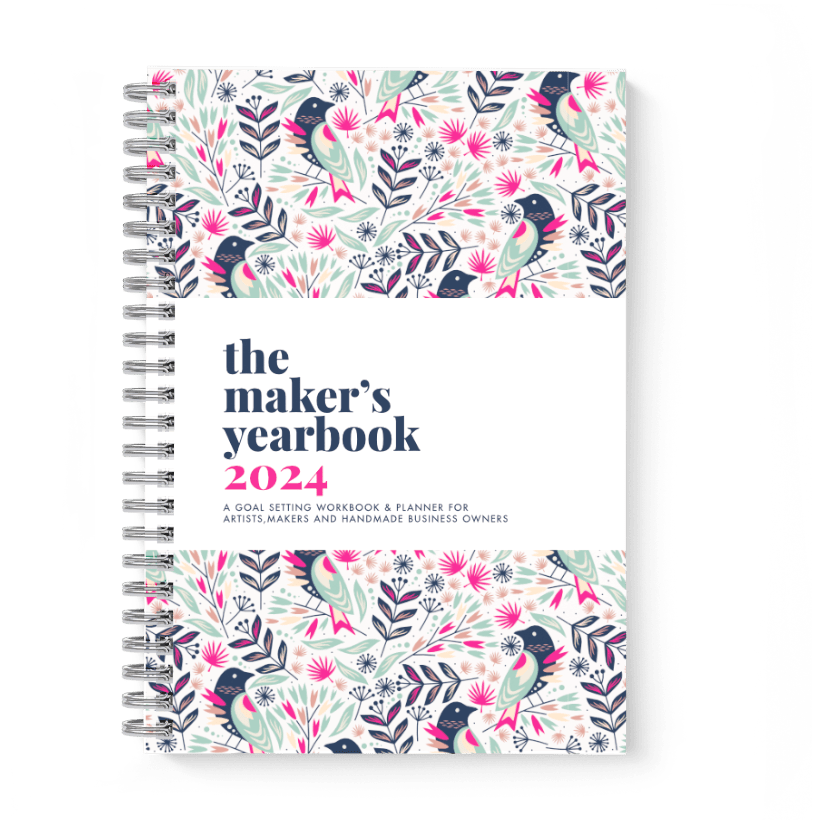What if I said that the majority of the problems and difficulties you are facing in your handmade or art business at this moment in time are all linked?
What if I said that they are the result of one small error?
What if I said that none of them could even start to get fixed before you correct this error?
It’s an error that all of us are making every single day. It’s an error that’s completely understandable and completely human and yet completely toxic to your business.
What is it?
Not listening to feedback. And we all do it.
There’s a common saying “When someone tells you who they really are, believe them.” It comes up all the time in relationship advice and I’m sure we’ve all had those conversations with a friend who is having the same issues over and over again in their relationship and yet never does anything about it.
And yet, that is the situation many (maybe even all) of us put ourselves in day after day in our businesses.
So what do I mean by “feedback?”
- When someone doesn’t buy your products, that is feedback.
- When you advertise in a magazine and get no orders or interest, that is feedback.
- When you discount your prices and you don’t get any more orders, that is feedback.
- When you build your website and no one visits, that is feedback.
- When you go to a craft fair and you don’t sell enough to make a profit, that is feedback.
Failing is feedback. It’s not a personal slight on you. It’s not a comment on your worth. It’s not a disaster. It’s just feedback.
And feedback is information that you can use to make important decisions about your business and your creative work.
Craft Fairs don’t work for you? Then try something else.
Discounts aren’t working? Then it’s not about your prices.
Website like a ghost town? You need to rethink your traffic strategy.
Follow what the feedback is telling you and you might be able to make your business ridiculously successful. Of course, equally you might not, but that is also valuable knowledge, especially if it comes before you lose a large amount of your savings.
Everything that works, or doesn’t work.
It’s all feedback
But many of us are so desperately afraid that the answer won’t be the one that we want that we avoid feedback at all costs. We chicken out of launching that new product. We spend months “researching” or “figuring it out.”
We repeat things that aren’t working again and again and again. We avoid numbers and tracking and measuring things so that we can’t see the truth.
And so we fail by default – we just don’t know it. And, importantly, we don’t know how to fix it.
Business is a process of testing things out and getting feedback so that we can adapt. Nobody is born simply knowing how to do this and even the most successful businesspeople in history have started with an idea and adapted to the feedback they got along the way. We’re doing the same.
You will never turn around that disappointing product by simply doing more and more and more of what you’ve already been doing.
By spending your time and effort in this way, you’ll never know or understand why the product isn’t working and you’ll never know whether to let it go or not.
And you will never make that amazing product that everyone can’t wait to buy and that gives them immense pleasure if you are completely focused on turning around a product that is never going to be a success.
So, if you knew that feedback was necessary and important and you knew that the only way to get it was to try (and possibly fail), what might you do differently?
Would you throw all of your business’ cash into buying a large amount of stock or materials for a product you thought would be a success?
Probably not.
And would you be brave enough to follow an opportunity that was different to the one you were expecting or planning?
Maybe you would.
To paraphrase Joseph Cambell:
“Would you be willing to let go of the business you have planned, so as to have the business that is waiting for you?”
We think we know what is best but we have no idea. We think we know which products will sell but often we have no idea (even if we are experienced). We think we know what price people will pay for something but we have no idea.
We have no idea about any of these things until we try them.
The moment we accept this fact is the moment that we stop playing at business and we start to actually build something that is capable of supporting us and our families.
Here are a few things to keep in mind when testing out new things:
1. Keep your expensese small, but not so small that you don’t give it a proper try.
If business is about testing out a few things and keeping the ones that work, it makes sense not to throw all of your resources into one product line, one show, one social media channel. Make sure that you can still carry on if this doesn’t work out as well as you hope it will.
Keep it small to begin with, test it, and invest more into the products and strategies that work.
2. Get into the habit of measuring and assessing things
Treat it all like an experiment. Measure as many things as you can and try to look at actual data, rather than simply considering how you feel about it.
You may find that you have really underestimated the success of one product and overestimated the success of another.
You might find that you have missed an expense out of your profit calculation and something you thought was working well is a lot less profitable than you thought.
3. Be willing to let go
There are times when we don’t fully commit to testing something out and bail at the first sign of difficulty. But, perhaps more often, there are times when we stick with a failing strategy for far too long, continuing with the same activities because we just don’t know what else to try.
Unfortunately, refusing to accept that something isn’t working leaves us with no space to consider why or what else we could do instead and this leads to a vicious circle of carrying on because it’s just what we know.
Measuring your results properly will help you to know when you’ve given something a really good try and it’s not improving.
4. Don’t assume that your business just needs to reach a certain level of growth
This is a mistake we often make in the early stages of running a business. We can ignore the feedback we’re receiving, thinking that we’re just too small at the moment, or that people need to get to know us and our products.
While it’s true that your customers need to see you and your products numerous times before they recognise your work and your brand, it’s usually easy to tell early on whether something is working or not.
Of course, at the early stages of business, there are often issues around pricing or branding consistently that can make it difficult to know whether the problem is with your product or something else but if the feedback is only lukewarm, there is an issue and it won’t simply disappear once you’ve been around a while.
So, let me ask you this:
What do you know isn’t working in your business right now? Are you listening to the feedback and trying to figure out where the problem lies?
Or are you just trying harder and harder? And what would you let go of if you knew that it would lead to something better?









